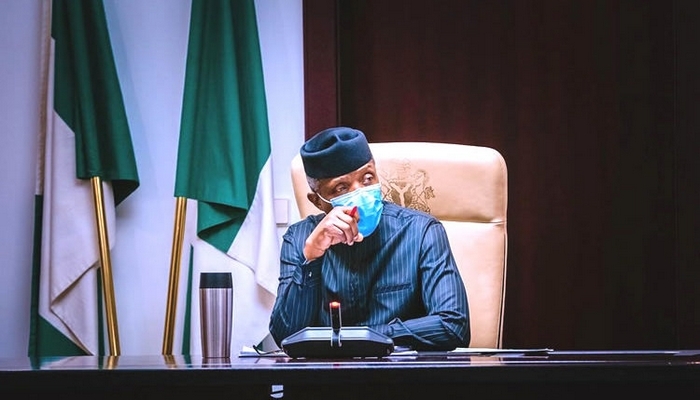
Vice President Yemi Osinbajo says the Federal Government will focus on developing Compressed Natural Gas (CNG) otherwise known as auto gas, in order to offer Nigerians an effective option to petrol rather than continuing subsidising petrol and electricity.
The vice president’s spokesman, Laolu Akande, in a statement on Saturday in Abuja, said Osinbajo made the remarks during a virtual interactive session hosted by the Africa Report magazine.
The vice president, in responding to a question regarding the removal of petrol subsidy, said that auto gas was priced significantly lower than Premium Motor Spirit (PMS).
“We have experienced a severe downturn in our finances over the years; so at 60 per cent less revenue, we are in a position where sustaining fuel subsidy is practically impossible simply because we do not have the resources.
“What we have decided to do is to focus on CNG which is about half the price of petrol today.
“So, if we use CNG for our cars and for our buses, it will cost between N78 and N80 or so per litre.”
He said that under the Nigerian Economic Sustainability Plan (NESP), the Federal Government’s objective was to promote domestic use of CNG.
Osinbajo said that one million jobs could be created by maximising the domestic use of CNG while reducing reliance on refined petroleum products like kerosene and Premium Motor Spirit (PMS).
On taxes, he said that the administration had no plans of increasing taxes as such was untimely.
“It is even more difficult for people to pay taxes now than ever before, I mean, given the state of affairs, but this is why we’re doing everything now.
“We are trying to ensure that businesses survive this period by providing as much support as we can, and by relieving them of as much burden as possible and ensuring that they are able to get some moratorium.
“So that they can at least continue to run their businesses and by all the other interventions and support that we are giving, we hope that those interventions will help businesses.
“Our approach is first to ensure that we save jobs. If we save jobs and save businesses, and then do the best we can in agriculture, the housing scheme and all of that, we will actually be able to improve spending.
“And if we are able to improve spending, taxes will definitely improve, and if businesses survive, taxes will improve.
“So, those are the sort of projections that we are looking at.”
On electricity tariffs, the vice president said the era of subsidising petrol and electricity was over as the government had adopted measures of addressing the situation.
According to him, the Federal Government is trying to reform the electricity industry.
“The industry is privatised except for the transmission sector; but what we have seen is that the distribution companies (DisCos) are just not able to meet their targets or to even provide electricity on any kind of stable basis now.
“The DisCos have been hankering all these years for a cost-reflective tariff and government has been paying the subsidy.
“In fact, in the past few years, we have spent about N1.3 trillion on subsidies for electricity. Again, here is a situation where that is completely unaffordable.
“We want to ensure that new companies come into the market; so, that will be decentralised completely.
“This way, in several parts of our country, we can have micro-grids, small grids, and all of that; we are doing 5 million solar connections as part of the Economic Sustainability Plan.
“We think that, with all these, we can electrify our country within a short period of time,”he said.
Osinbajo stressed that the target of government in the NESP was to save existing jobs and revamp businesses by improving the spending capability of Nigerians through the various initiatives in industry, agriculture, mass housing, and solar connectivity projects.






